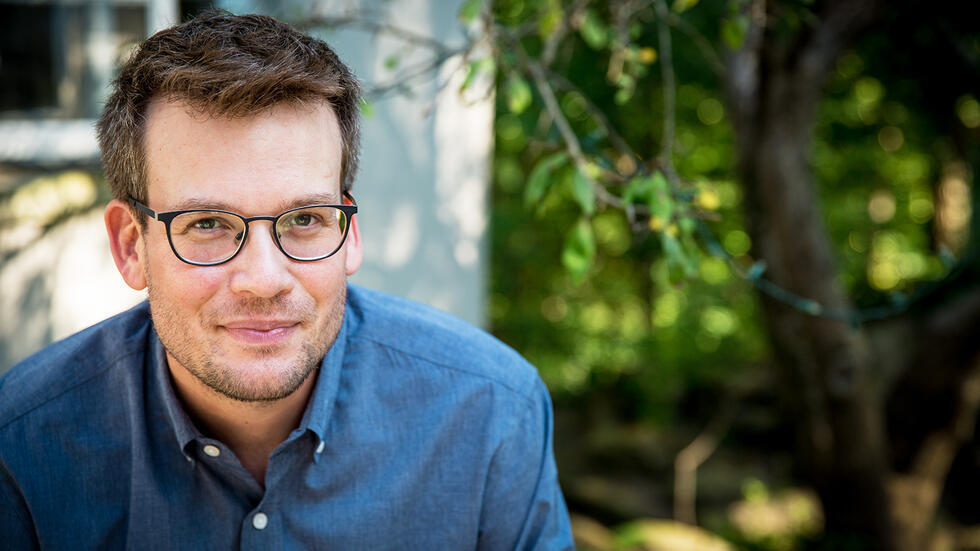 New York Times bestselling author John Green will speak at the Memorial Church, 7 p.m., Oct. 14, as part of the 2022-2023 William Belden Noble Lectures.
New York Times bestselling author John Green will speak at the Memorial Church, 7 p.m., Oct. 14, as part of the 2022-2023 William Belden Noble Lectures.
Live Stream Begins at 7 p.m., Oct. 14
By Jeffrey Blackwell
Memorial Church Communications
New York Times bestselling author John Green will open the 2022-2023 William Belden Noble Lecture series at the Memorial Church, 7 p.m., Oct. 14, with a deep plunge into the subject of apocalyptic climate change.
Green is the author of such well-known titles as “The Fault in Our Stars, Turtles All the Way Down,” and “The Anthropocene Reviewed.” He is also a podcaster, philanthropist, and one half of the vlogbrothers on YouTube, which has nearly 3.5 million followers.
Green’s lecture “How the World Ends,” is a not-so-subtle hint at the urgency and seriousness of the rising global climate crisis. His latest book, “The Anthropocene Reviewed,” explores in 40 short essays how to live in a world of accelerated uncertainty.
"We are at once far too powerful and not powerful enough," he writes in the introduction of the book. "We are powerful enough to radically reshape the Earth's climate and biodiversity but not powerful enough to choose how we reshape them. We are so powerful that we have escaped our planet’s atmosphere. But we are not powerful enough to save those we love from suffering.”
Those lines pinpoint the theme of this academic year’s Noble Lectures. The four-part-series is purposely designed to open unvarnished discussions about moral and ethical questions surrounding our environmental crisis, and the role we all have in this global reckoning.
“Part of our responsibility as Christians is to pay attention to folks who are already suffering. It's not just about anticipating our own suffering and preparing for our own suffering. It is also about caring for the people suffering now – the people here, and on the other side of the world,” said The Rev. Matthew Ichihashi Potts, Pusey Minister in the Memorial Church, Plummer Professor of Christian Morals in the Faculty of Divinity. “Thirty-three million people in Pakistan were displaced by floods, which were caused by a nonstop monsoon all summer, which is caused by climate change.”
With the list of extreme environmental events on the rise, the invitation to pay attention to the climate is clear. Heat waves, drought, floods, forest fires, severe storms, receding glaciers, and other climate events — from floods in Pakistan to destructive hurricanes in Puerto Rico and Florida, and a water shortage in Mississippi — make headlines nearly every day. For many, these events are revealing the eerie specter of a climate and society in immediate danger.
Part of the overall discussion of the series will be directed on how not to become overwhelmed in a spectrum of simmering emotions — fear, empathy, guilt, anger, and hopelessness — to the point of inaction Potts said.
“There are technical questions about how we respond, how we mitigate harm, but there are also going to be justice, value and meaning questions,” he said. “What does it mean when people die? How do we deal with that pain? How do we think through who is lucky enough or powerful enough to survive or avoid the worst effects of climate change, and who is not?”
In addition to Green, the Noble’s distinguished guest speakers will focus their lectures around many of these questions and others centered on ethics, action and redemption:
- Norman Wirzba, Gilbert T. Rowe Distinguished Professor of Theology, Senior Fellow, Kenan Institute for Ethics at Duke University’s Divinity School, Nov. 10. His research is at the intersections of theology, philosophy, ecology, and agrarian and environmental studies.
- Dekila Chungyalpa, Director of the Loka Initiative at the University of Wisconsin – Madison, March 22. Her organization supports faith-led environmental efforts locally and around the world through collaborations with faith and Indigenous leaders on environmental protection, sustainable development, and climate issues.
- Emmanuel Katongole, Ph.D., Professor of Theology and of Peace Studies, University of Notre Dame, April (date to be determined.) His research is focused on politics and violence in sub-Saharan Africa, theologies of peace and reconciliation, and their intersection with environmental sustainability movements.
The William Belden Noble Lectures were established in 1898 by Nannie Yulee Noble in memory of her husband. Past speakers have included author Marilynne Robinson, U.S. Sen. Raphael G. Warnock (D-Gerogia), and former Harvard President Drew Faust.
This year’s series is expected to continue a tradition of creating opportunities for powerfully candid conversations and space for difficult questions, such as the issues facing society from the threat of apocalyptic climate change.
Potts said his interest in religious responses to climate change was spawned by a 2017 article in New York Magazine about how scientists and activists are in a bind because they don’t know how to talk openly about the climate dangers we face. They feared, according to the story, that telling the truth would cause people to despair, whereas failing to tell the it might encourage false hope.
“But maybe we humans have more tools than the people who worry about creating despair are giving us credit for,” said Potts. “We can tell the truth about what's coming and people might feel shock and resistance. But I also think humans are capable of looking at it and saying ‘my two options aren't just denying or accepting, I can also choose to love the thing that I might be losing.’”
